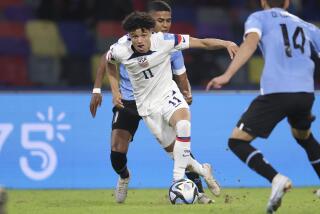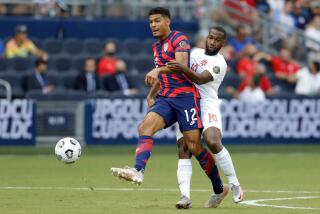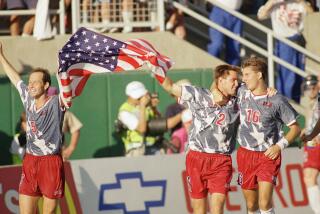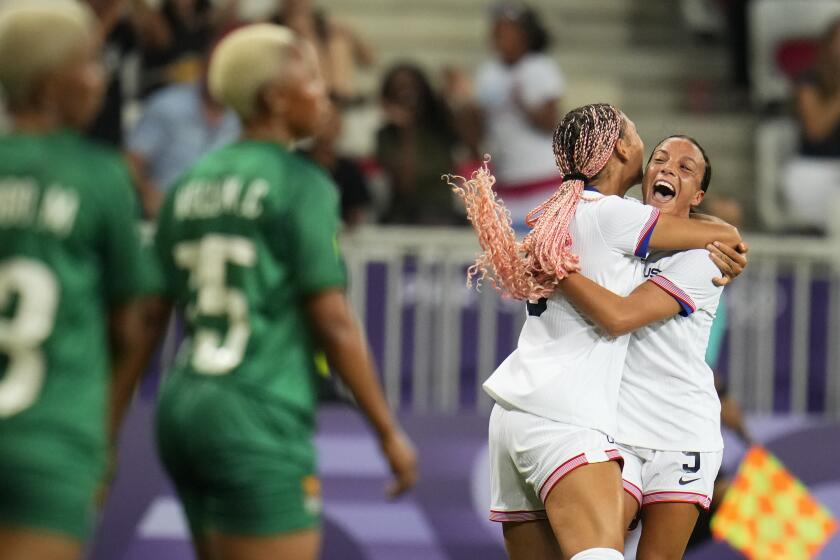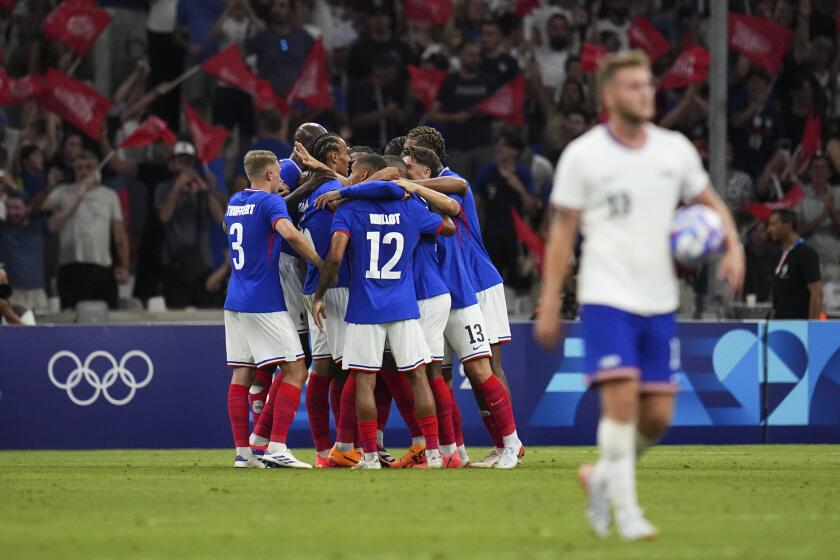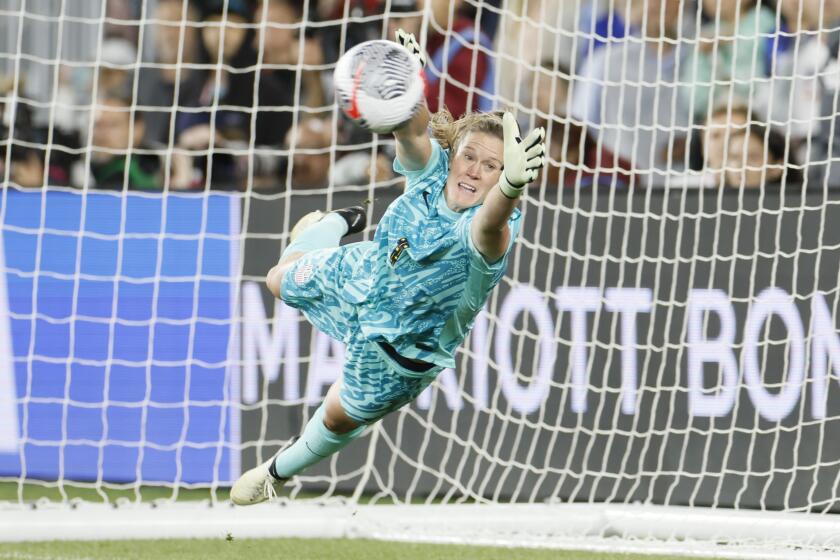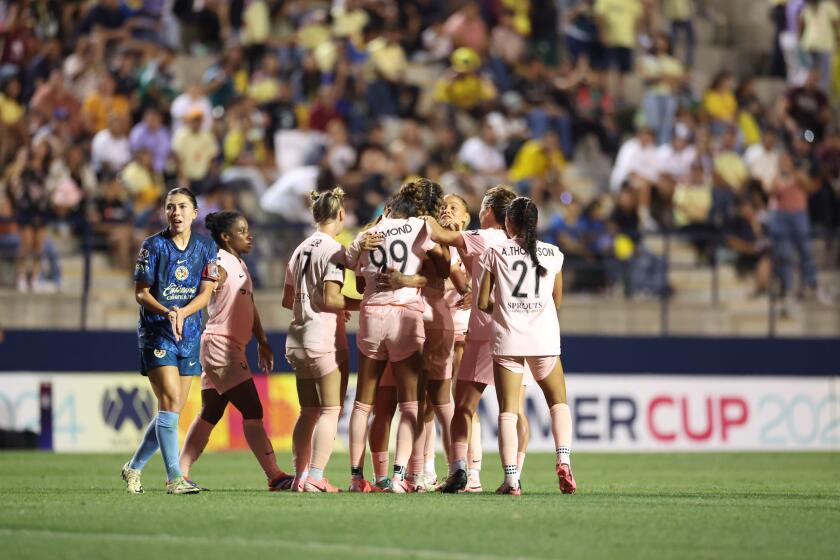German-born sons of U.S. soldiers living a dream playing soccer for U.S. national teams

Hertha defender John Anthony Brooks, right congratulates teammate Vedad Ibisevic after scoring against Schalke 04 during a Bundesliga game on March 11.
John Anthony Brooks and Jerome Kiesewetter were close friends growing up in Berlin, where they quietly harbored the same dream.
As dual-national, German-born biracial children of U.S. soldiers stationed in Berlin, both knew they had a choice of playing soccer for Germany or the U.S. And both pledged their allegiance to the U.S. before finishing grade school.
“We decided long ago, back when we were about 10 or 11 years old, that it would be our dream to one day play together for the United States,” said Brooks, a towering defender for Hertha Berlin in the German Bundesliga. “Way back then we just thought it would be a great idea to learn more about our other half, a chance to discover our American side.
“It’s a great feeling to play for the United States. We can’t wait to be on the field together for the first time.”
We’ve shared everything for as long as I can remember. ... We’ve got a special friendship.
— John Anthony Brooks
That might not happen for a while. Though Brooks and Kiesewetter, a fast and fearless forward on VfB Stuttgart’s reserve squad, both were summoned to the U.S. national team for important playoff games this week, they were placed on different rosters.
Brooks went with the U.S. senior team to Guatemala for a World Cup qualifier Friday (7 p.m. PDT, beIN Sport, NBC Universo) while Kiesewetter will play for the U.S. in an Olympic qualifier in Colombia the same night (3 p.m. PDT, FS1, Univision Deportes).
Both series then move to the U.S. next week with the senior team, which leads its four-team Cup qualifying group after two games, hosting Guatemala in Columbus, Ohio. Meanwhile, the Olympic team, which needs to win the two-leg playoff with Colombia to qualify for the Rio Games, will play in suburban Dallas where Kiesewetter’s father plans to be in the stands watching.
Should the U.S. qualify for the Olympics, that could lead to a reunion for Brooks and Kiesewetter since both are age-eligible for the Summer Games, a U-23 tournament. They hope to play on the senior team together one day. Not that they’ve ever really been separated.
In fact, after Brooks endeared himself to U.S. fans with a game-winning header in a World Cup opener in Brazil in 2014, one of the first people he called was Kiesewetter, who was asleep back home in Germany.
“We’ve shared everything for as long as I can remember,” said Brooks, 23. “We’ve got a special friendship.”
Kiesewetter, only 12 days younger than his childhood friend, agrees.
“We’re like brothers,” he said. “We share so many of the same interests. Everything we did, we did together.”
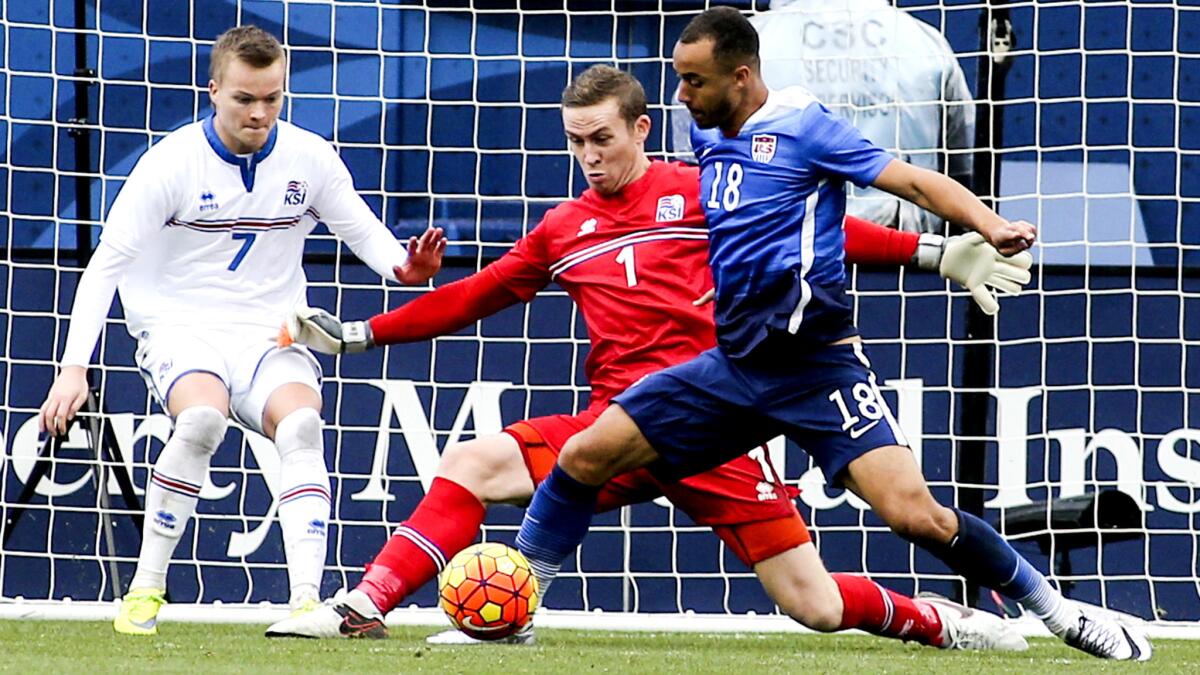
U.S. forward Jerome Kiesewetter tries to gather a pass near Iceland goalkeeper Sean Johnson and midfielder Aron Sigurdarson during an exhibition game Jan. 31 at StubHub Center.
Kiesewetter speaks English with a slight Texas accent, a result of weekly phone conversations with his father, a retired soldier who lives in Austin and with whom he several years ago reestablished contact.
Kiesewetter’s parents separated when his father and the rest of the U.S. Army left Berlin in 1994. But while Kiesewetter stayed with his German-born mother in Berlin, he never lost the American half of his identity. The first soccer jersey he remembers buying was a U.S. national team shirt he wore during the 1998 World Cup, when the U.S. and Germany played in the same group.
“When I was growing up people would ask me, ‘Where are you from?’ and I would always say ‘I’m from Germany,’” said Kiesewetter, who made his first two appearances with the U.S. senior team in January after playing five years on junior national teams. “But they would usually then ask, ‘Yeah, but where else?’ because of my skin color. So I started saying, ‘I’m American.’
“My mother and I have always had a lot of American friends and the American culture was always a big part of our lives in Berlin.”
Brooks embraced his American half as well, attending a bilingual high school named after John F. Kennedy. He also has two family tattoos, his left elbow carrying an outline of the Berlin district of Mariendorf where he grew up and his right sporting an outline of Illinois, his father’s home state.
So both he and Kiesewetter say they are puzzled by complaints that Juergen Klinsmann, the U.S. national team’s German-born coach, passes over homegrown players in favor of German Americans such as Brooks, Kiesewetter, Julian Green, Jermaine Jones and Fabian Johnson. There were more than 400,000 American soldiers in West Germany and West Berlin during the Cold War.
“It’s unfair but you just have to deal with it,” Kiesewetter said. “It’s disrespectful towards my father. He was an American soldier in Berlin for 21/2 years and served in the army for 25 years. It’s just wrong for some people to say his son is not American.
“I’m an American.”
And in soccer, at least, that’s all he’s ever wanted to be.
Kirschbaum is a special correspondent who reported from Berlin. Baxter is a Times staff writer who reported from Los Angeles.
MORE FROM SPORTS
Soccer’s popularity continues to rise in Cuba
Column: U.S. women’s soccer team still has a long way to go on equality scale
Omar Gonzalez and Gyasi Zardes reunite on the U.S. national soccer team
